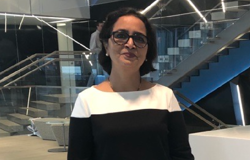My first steps on the road to a career in STEM came via my high school. I saw a presentation on medical MRI scanners and how they detect diseases earlier via instruments and machines. It sparked a passion and was a defining moment on the road to wanting to become an engineer.
Fast forward many years later and I am now a senior principal program manager at Intelsat and am very fortunate to have a job where variety is constant and - although it sounds cliché - the reality is that no two days are ever the same.
Broadly my main responsibility at Intelsat is preparing for any new satellites that are coming into our network. Therefore, my days usually involve working with the satellite operations engineering and IT teams to ensure that the new satellites are integrated into our ground systems so they can be ready for operations. We talk through the data that our systems produce and make sure we are on track with all of our projects. In my previous roles, I have also developed procedures for the controllers and engineers working on satellite operations, so lots of time in my day is often spent refining and improving these procedures and ensuring they are future proofed.
Maintaining positive and productive relationships with our partners and the satellite manufacturers is also central to the role. Intelsat acquires satellites either after the satellite is in space or in some cases, once they release in space from the rocket. So we have to keep close contact every day with the manufacturers to make sure the handover is smooth, ensuring the satellites ultimately reach their parking spot in orbit above the Earth. This also involves continual data analysis to ensure all is on track, which my broader team supports. The handover deadline is one that cannot be moved so if we aren’t ready, this has implications for the company and the wider team working on the satellite launch.
Another big part of the job is being prepared for the unexpected and when these unexpected moments do arise, it is crucial you have a trusting and strong team. Throughout my 23 years at Intelsat, I have had some great managers, mentors and teammates, all of whom have been really supportive and built my confidence and expertise through their willingness to give me lots of training. This has been instrumental to my professional development, particularly when I first joined the business. I’m a big advocate of training and professional development because I always believe that if you provide the right opportunities and the right exposure, you can build a talented, diverse team.
In particular, I see building up female representation in the industry across all levels as especially important. When I first joined Intelsat, I was the only woman in a team of about 30 men. Yet, the landscape is now very different and there are far more women in STEM roles with good career progression opportunities. At Intelsat, it’s been really refreshing to see how other female engineers shine in the team and lead various projects.
Apart from our day-to-day work, we also have the “take your child to work” day from time to time. I recall when my daughters were four and six years old, the company organized a satellite launch mission for the kids to better understand the amazing work we do at Intelsat. It was so much fun, and I think it really struck a chord with them. It was great to see how we spark the next generation’s interest, and it reminds me of how I was attracted to the STEM industry!
Working with satellites is always exciting and it is certainly not as intimidating as some people might think. I continuously feel like I am at the heart of the action being so focused on satellite launches and it has been a very rewarding experience. I would encourage anyone out there, looking to take those first steps, just to get their foot in the door, and explore every opportunity. Don’t be shy about talking about what you are passionate about, take the opportunity and own it.

Lalitha Jayanti is a Senior Principal Program Manager at Intelsat











Water Sector Talent Exodus Could Cripple The Sector
Well let´s do a little experiment. My last (10.4.25) half-yearly water/waste water bill from Severn Trent was £98.29. How much does not-for-profit Dŵr...